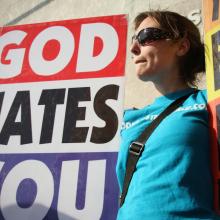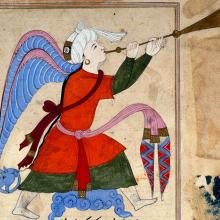Christianity
But, interpretation of who Matthew 25:40 refers to as “the least of these” has gained attention most recently with many claiming that Jesus was speaking solely about his disciples or other Christians instead of the marginalized and oppressed communities that the verse so clearly seems to point to.
Throughout the history of theology, Mix said, Christians have swung between the idea that Earth can be the only inhabited planet because God favors humans, and its counterpart, that to assume Earth is the only inhabited planet is the height of human pride because God is limitless and all-powerful.

Image via Joann Kim
At Standing Rock, I had to ask myself a difficult question: Was my solidarity based on a deep commitment to seeing out the fruition of justice, or was my solidarity and presence momentary, divorced from a long-term commitment?
The simple standard for Christianity is how well we’re emulating Christ. So how Christ-like are we? Right now, American Christianity isn’t doing so great, which is why non-Christians can be—and often are—even more Christ-like than many self-professed Christians.
“Dutch values are based on Christianity, on Judaism, on humanism. Islam and freedom are not compatible,” populist politician Geert Wilders, 53, said in an interview with USA Today. “You see it in almost every country where it dominates. There is a total lack of freedom, civil society, rule of law, middle class; journalists, gays, apostates — they are all in trouble in those places. And we import it.”
Receiving a prestigious human rights prize, an Iraqi lawmaker, who gained international attention for her oppressed Yazidi religious minority, decried the Trump administration’s “unfair” executive order on immigration.
The Quran teaches that “verily with hardship, there is relief.” I have found relief in community with Muslim sisters and brothers, with whom I share common virtues and a common future. I love them not despite of my faith, but because of it. After all, Jesus was a Palestinian refugee who loved his neighbors, even those who did not share his Jewish faith. As a Christian, I have no choice but to do the same.
While the ban remains inactive after the Ninth Circuit Court of Appeals denied the U.S. government’s request to resume travel restrictions, legal challenges by Trump’s administration will continue. Christians must join in solidarity with our refugee brothers and sisters and continue to denounce both the ideology and methodology of the ban.
Huston Smith, the man who helped the world understand other faiths, perhaps more than almost anyone else, died on Dec. 30 at age 97.
I first learned of it when my oldest sister, who lives in Berkeley, Calif., not far from Huston and Kendra Smith, sent me a note saying he had breathed his last about 7:30, the morning of Dec. 1, at his Berkeley home.
I was surprised that it took until Jan. 1 for a news story to show up about the death of this remarkable religion scholar.
Americans voted largely along the lines of race, education, and party identification. Nonwhites strongly preferred Clinton, while whites decisively chose Trump. Compared with past Republicans, the businessman received a stunning surge of votes from non-college-educated white voters.
None of this is surprising.
And yet the result upends so much conventional wisdom.
How can salvation be believed when we refuse to save refugees, or hope grasped when we deny it to immigrants, or justice pursued when we refuse it to the oppressed, or faith accepted when we don’t have faith in those different from us, or love known when we deny it to our neighbors, strangers, and even our enemies?

Image via Ozgur Coskun/Shutterstock.com
The study comes in the same year that Larycia Hawkins — Wheaton College’s first black, female professor to receive tenure — parted ways with the evangelical flagship school after she posted on Facebook that both Christians and Muslims worship the “same God.” The controversy stirred fresh debate among evangelicals about whether all religions worship the same God, and whether God accepts the worship of all religions.
In Jerusalem, Boehm said, there was a “very thin membrane” between the earthly and metaphysical.
That porousness is the origin of all the show’s marvelous art and of many of the city’s troubles, past and present. Almost lost on one wall of the show is a photograph of a glorious pulpit that stood in the Al-Aqsa Mosque from 1188 until 1969, when a delusional Australian torched it. He was trying to destroy the mosque so that the temple could be rebuilt to facilitate Jesus’ return.

Image via Tithi Luadthong/Shutterstock.com
Thank God for the internet.
If you believe in God, that is. For a time, Mike McHargue did, and then he didn’t, and now he does again.
But it’s on the internet where McHargue — better known as “Science Mike” to listeners of “The Liturgists” and “ Ask Science Mike” podcasts — found community when he was questioning his Southern Baptist upbringing and then the atheism he had adopted. And it’s on the internet where he’s forged a community with others like him who can’t comfortably wear either label: Christian or atheist.

Image via Eakachai Leesin/Shutterstock.com
Why is it so difficult for people of faith, who manage to structure their community and life around the belief of an unseen God, to not able to believe the very visible, tangible words and cries of their flesh-and-blood neighbors? Who forget that the very image of God is imprinted into these bodies?
O you of little faith, why don’t you believe?
Christian communities get romanticized as places populated with ideal human beings who reflect a pursuit of individual morality in a community of righteous individuals. Yet, in a society organized by race, ideal humanity is always white. Race has calibrated dominant streams of Christianity according to the goals of white supremacy rather than allowing the gospel to calibrate human social interaction toward justice. Christianity scrubbed of justice turned Jesus into a white man, and the gospel into a message of individual morality, calibrated to the language of virtue derived from Jesus as a fetish of idealized white masculinity.

Image via SunSlice Photography/Flickr
As a wizened old veteran of the fight, I struggle with discouragement sometimes. It is not just that many Christians fail to live up to the clear demands of Christian discipleship. It’s that we can’t even agree on what those demands are. We all say we believe in Jesus, but what we make of that belief is so irreconcilably different that I am not sure that we are in any meaningful way members of the same religious community.

Image via Vaguely Artistic/Shutterstock.com
As Christians, our actions and our words represent our faith. I don’t need a bumper sticker to tell you that. Let’s make sure the loudest voices are the ones for equity and transformative love across difference. Because each day as a Christian, you cast your ballot.
I’m a Christian, and each day, I vote.
Since the beginning of the modern era almost 500 years ago, Western culture has been marked by a distinct aversion to history. Thus we have come to narrate our lives primarily through our stories as (seemingly) autonomous individuals, instead of through the social stories of the peoples and places to which we belong. One of the unfortunate consequences of this shift is that we often become blind to the socioeconomic narratives that have set the stage for our present lives.
One of these is white supremacy, which has shaped the geographical, educational, and economic systems of our land over many generations and played a formative role in the life of almost every American. In his excellent new book, Trouble I’ve Seen: Changing the Way the Church Views Racism, Drew Hart turns our attention to this story and particularly to the ways it misshapes our Christian faithfulness. Hart begins the book with a description of how racialized our lives are. Historically, nonwhites were excluded from many important spaces in U.S. public life: schools, governmental positions, and even churches. Although few, if any, of these spaces today explicitly exclude nonwhites, our socioeconomic systems are rooted in these earlier eras and continue to promote a highly segregated way of life. “When we can be honest about how our entire society is deeply racialized,” Hart says, “we will be ready to move forward.”
Hart reminds us that race is not simply about the color of one’s skin but also about power and the question of who gets to dictate the course that our society will follow. Early in the book, he spends a chapter exploring how our understanding of Jesus is often too white. We are inclined to imagine Jesus as an influencer, one who works in the upper echelons of our hierarchical society and who has the power to control the course of society. Hart emphasizes that this is not the Jesus that we find in the gospels, who aligned himself with the marginalized and who mostly rejected hierarchical society. “Where the old order dominated and violently lorded over others,” Hart observes, “the kingdom of God arose from the bottom, margins, and cracks of society, freely inviting people to share in the peace and justice of God made available in the presence of Jesus.”

Image via Pew Research Center / RNS
Fewer men than women show up in U.S. churches, and women are markedly more likely to pray and to hold up religion as important. But in Muslim nations, it’s the women who are missing in action at the mosque — and yet they’re on par with men in upholding almost all the Muslim pillars of faith.












